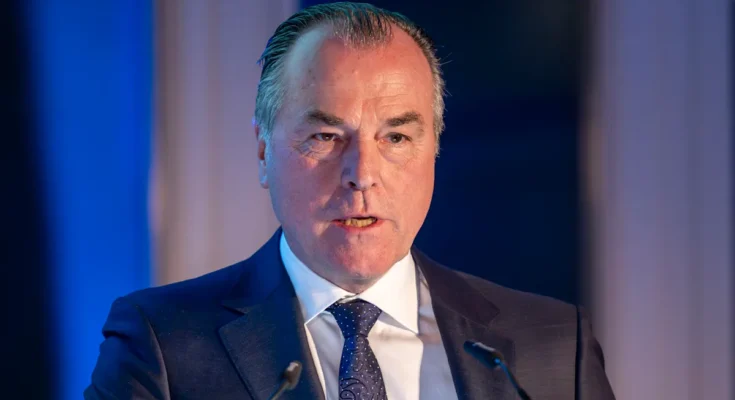A surprising turnaround in poker takeover in the slaughter industry: After previously making firm statements to the Federal Cartel Office and its competitors, market leader Tönnies gave up his ambitions.
Germany’s largest meat company, Premium Food Group (PFG) has surprisingly given up its attempt to take over a German slaughterhouse owned by its Dutch competitor, Vion. Managing partner Clemens Tönnies offered to terminate the purchase agreement made with Vion – combined with rival Westfleisch’s commitment to take over related sites in southern Germany. “It’s not about Tönnies. It’s about Bavaria and Bavarian farmers,” the businessman said at the Bavarian Farmers’ Association’s autumn dialogue in Herrsching. “This relationship must end.”
The standoff refers to a dispute with the Federal Cartel Office. The competition authority has banned PFG from carrying out the agreed takeover after nine months of merger control and justified its decision by the dominant market position PFG will achieve through the purchase of cutting, cutting and hiding processing plants in Crailsheim, Buchloe and Waldkraiburg. The family company has filed a complaint against this with the Düsseldorf Regional High Court and also announced that it will consider the possibility of obtaining ministerial approval. “We will fight for the location and use all legal means.”
The industrial giant, which will no longer only be Germany’s largest pig slaughterer with the deal, but will also become its leading cattle slaughterer, remains confident that it is on the right side. “The company still sees a good opportunity to take action through a Regional High Court decision or through possible ministerial approval,” said a statement from Premium Food Group. However, this requires time, which the agricultural sector in southern Germany does not have.
Today there are not many large slaughterhouses left in southern Germany. Therefore, there are concerns in the political and agricultural fields regarding supply bottlenecks and structural divisions. As part of its strategic realignment, Vion wants to withdraw from the highly competitive German market and concentrate more on the Benelux countries. This could also result in closure if the takeover fails. “In the last weeks and months we have developed many new ideas for solutions because we believe in the region. But there are always glitches,” said Patriarch Tönnies, without wanting to go into detail.
This could mean the two authorities, who reportedly find it difficult to cooperate. But also a competitor to Westfleisch. The cooperative from Münster initially did not bid in the race for the Vion site, but later expressed interest and denounced Tönnies as a buyer in a letter to Federal Economy Minister Katherina Reiche (CDU).
Now Tönnies has reversed course after his earlier terse words – and at the same time put the competition under pressure. “If you promise here in front of the whole team that you will take over all three companies, we will immediately withdraw from the contract with Vion,” the businessman offered to Westfleisch, whose CEO Wilhelm Uffelmann was also on the podium at the autumn dialogue. His response: “Okay, then we’ll do it.”
Westfleisch has now confirmed his interest in an official, but less definitive, statement. “Westfleisch keeps its promise and is ready to cooperate with Vion in finding a viable solution for the interests of Bavarian agriculture,” the company reported. However, a concrete statement cannot be given because Westfleisch has not been able to look into Vion’s book.
Several interested parties have contacted us
This should happen as quickly as possible. “After the Federal Cartel Office banned plans to sell the Vion location to Premium Food Group, the two parties have agreed in recent days on how the avenue can be opened to other interested parties,” Vion reported. So far it has failed due to a purchase agreement between Vion and Premium Food Group. However, the deal with Westfleisch is not a done deal. “Several interested parties have contacted us,” said Vion. “We will carefully examine all serious suggestions. The aim is to find a long-term and viable solution.”
In the first round of bidding, there was reported interest from meat producers from Ireland, France and Austria. Experts worry that international companies are not interested in entering the German market. “They are only striking to secure access to raw materials,” said Klaus Martin Fischer, partner at consulting firm RSM Ebner Stolz. The slaughtered cattle will then be transported abroad for further processing and then withdrawn from the German market. Tönnies also recently warned about foreign buyers and the “meat supply shortage” this might cause.
Beef ranks third on the meat menu in Germany after pork and poultry. Per capita consumption reached nine kilograms last year, according to figures from the Federal Information Center for Agriculture (BZL). In 2024, pork will be around 28.4 kilograms and poultry 13.6 kilograms.
This article was written for WELT and the Center for Economic Competence Business Insider made.
Carsten Dierig is a business editor in Düsseldorf. He reported on trade and consumer goods, mechanical engineering and the steel industry as well as medium-sized companies.


